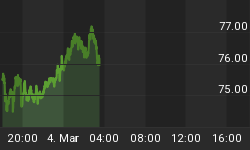Central banks have traditionally kept their reserves in relatively low-yielding, highly liquid government securities, agency debt, money-market instruments and bank deposits. The most current official IMF figure for official worldwide foreign currency reserves is US$5.89 trillion. At US$1.35 trillion, China holds the world's largest pool of official reserves, followed by Japan with US$911 billion and Russia with US$403 billion.
In addition to these reserves, market estimates for the total value of Sovereign Wealth Funds (SWF) run as high as US$2.5 trillion. This compares to US1.6 trillion for hedge funds. These are state-owned and operated funds, comprising of financial assets such as stocks, bonds, or property not included in the IMF figures. The use of these funds enables large reserve holders to invest in higher yielding instruments.

These funds fall into one of two major categories: commodity funds or non-commodity funds. Commodity funds are established through commodity exports (either owned or taxed by the government). Commodity based funds are normally from petroleum revenue but not always, as is the case for Chile's US$3.9 billion Copper Stabilization Fund. Non-commodity funds are typically established through transfers of assets from official foreign exchange reserves. Market estimates currently attribute approximately two-thirds of SWFs assets to commodity funds and the remaining one-third to non-commodity funds. The largest SWFs are detalied below.
| Country | Fund Name | Assets (US$bn) | Inception | Origin |
| U.A.E. | Abu Dhabi Investment Authority | 875 | 1976 | Oil |
| Singapore | Government of Singapore Investment Corp | 330 | 1981 | Non-Commodity |
| Norway | Government Pension Fund | 300 | 1990 | Oil |
| Saudi Arabia | Various | 300 | N/A | Oil |
| China | State Foreign Exchange Corp | 300 | 2007 | Non-Commodity |
| Singapore | Temasek Holdings | 100 | 1974 | Non-Commodity |
| Kuwait | Kuwait Investment Authority | 70 | 1953 | Oil |
| Australia | Australia Future Fund | 50 | 2004 | Non-Commodity |
| USA (Alaska) | Permanent Reserve Fund | 35 | 1976 | Oil |
| Russia | Oil Stabilisation Fund | 32 | 2003 | Oil |
| Brunei | Brunei Investment Agency | 30 | 1983 | Oil |
| South Korea | Korea Investment Corporation | 20 | 2006 | Non-Commodity |
These funds enable countries to diversify their portfolios and begin investing outside of US denominated investments. While the U.S. dollar still accounts for the majority of official foreign exchange reserves that dominance has been waning. In the second quarter of 2001 it stood at 56.6% and has since fallen steadily to 42.2%.
Published on http://dollardaze.org/ - Jun 30, 2007.
















